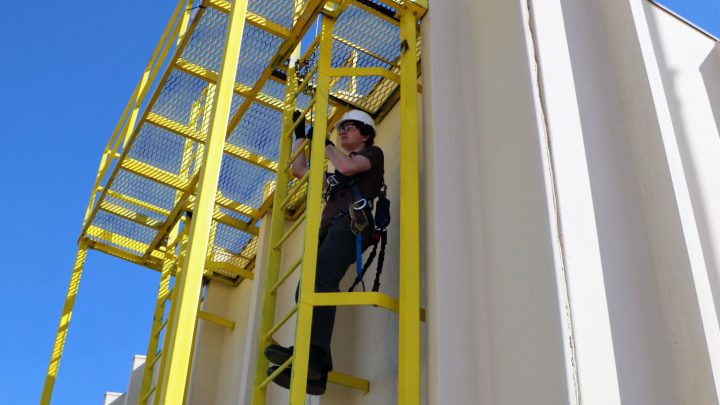
The clean energy boom is a rural jobs bonanza

A gale was recently tearing through Colorado’s rural eastern plains, an inspiring sound for Benjamin Sussman.
“It is generating power,” Sussman said. “All the farms near here, that’s why there’s so many built out in the plains.”
Sussman is a student in the Renewable Energy Department at Northeastern Junior College in rural Sterling, Colorado. It’s one of the few degree programs in the country for aspiring wind turbine technicians, like Sussman.
“I’m hoping to go straight into the wind industry,” he said.
While his classmates fiddled with wires and circuitry in the lab, the 22-year-old suited up in safety gear to practice the ladder climb. He adjusted his hard hat, buckled into a harness, and up he went.
In that simulation, Sussman’s ladder was only about 20 feet tall. In the field, he’ll have to climb turbines as high as 300 feet or more.
“I’ve always been interested in climbing something supertall,” he said. “I climbed a lot of trees as a kid.”
But Sussman isn’t just indulging his love of heights; he’s making a smart career move. Demand for wind turbine technicians is booming. It’s the fastest-rowing occupation in the country, according to the U.S. Bureau of Labor Statistics.
“It has been difficult to keep up,” said Kevin Schroeder, senior vice president for renewable operations with Invenergy, a clean energy producer with wind farms across the globe. “Each quarter, we have more projects, and we continually have job postings out there looking for qualified individuals.”
Last year, his company doubled its domestic wind technician workforce to 400, and this year it’s planning to hire hundreds more.
Clean energy is exploding in the U.S. — a trend that’s only accelerating as nearly $400 billion in Inflation Reduction Act investments give a boost to the industry through 2031. When it comes to wind, that piece of the clean energy pie is expected to more than double over the next 25 years, according to Department of Energy forecasts.
National and local climate goals for a rapid transition away from fossil fuel power has been feeding the growth. It also helps that renewables have been getting cheaper to produce. Since 2010, the country’s wind capacity more than tripled. It’s now the largest source of carbon-free energy in the United States — and most of it is produced in rural communities like the area around Sterling, Colorado.
“When we look at developing utility scale renewable energy projects, they’re very commonly in rural areas of America, where there’s ample real estate for wind turbines and solar panels,” Schroeder said. “That is pretty common for us to be developing in rural areas across the United States.”

That means all those wind tech jobs will be rural jobs, and high-paying ones at that. The median income for wind techs is just under $62,000 a year.
Jason Winter, who teaches in the renewable energy program at the junior college in Sterling, grew up in the area and sees the clean energy transition as a potential game changer for the locals.
“If they don’t have a family farm to work on, they really don’t have a lot of opportunity,” Winter said. “Now, when we have all of a sudden really good-paying jobs, it makes sense to stay here. I think that’s huge for the community.”
Finishing up on the ladder, Benjamin Sussman said he can’t wait to take advantage of all that rural opportunity.
“I think this is honestly one of the greatest mix of things that I could do,” he said. “It involves climbing things, involves working with my hands. There’s an electrical component, a mechanical component. I think it’s a mix of all the things that I’ve thought about growing up.”
Sussman has an internship this summer maintaining turbines at a wind farm on Colorado’s Eastern Plains. He hopes to continue the work when he graduates next winter.
There’s a lot happening in the world. Through it all, Marketplace is here for you.
You rely on Marketplace to break down the world’s events and tell you how it affects you in a fact-based, approachable way. We rely on your financial support to keep making that possible.
Your donation today powers the independent journalism that you rely on. For just $5/month, you can help sustain Marketplace so we can keep reporting on the things that matter to you.











